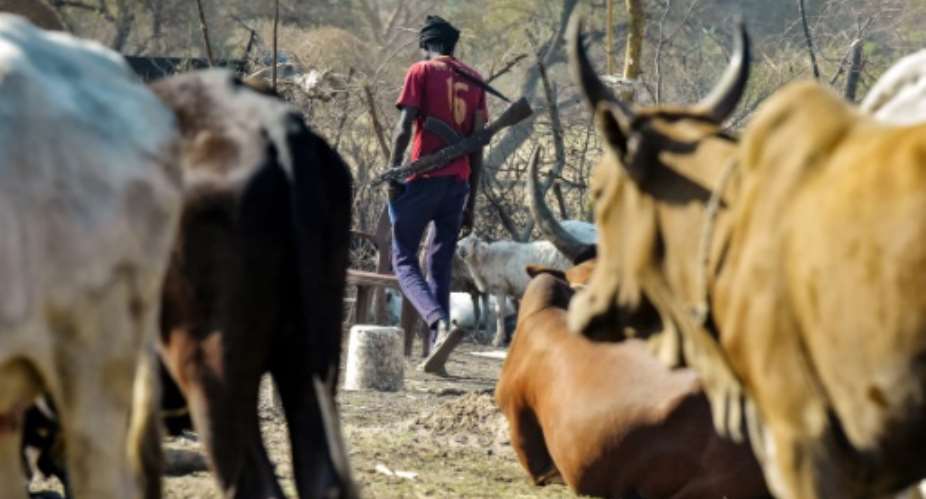Kenya and Uganda failed to enforce sanctions on their war-stricken neighbour South Sudan, including an arms embargo and travel bans, UN special investigators said in a report published Tuesday.
Providing an update to the Security Council, UN monitors said they had identified bank accounts in Kenya linked to rebel leaders and evidence of Ugandan military forces inside South Sudan, among other infringements by East African nations.
"The region has not consistently enforced the arms embargo or the asset freeze and travel ban on sanctioned individuals," said the Security Council-mandated team of expert investigators.
The panel said inconsistent international support for a South Sudan peace deal had contributed to a "dangerous stalemate" in a country where some 400,000 have died in fighting since 2013.
It singled out Kenya, Uganda, Ethiopia and Sudan as having "not demonstrated full and consistent engagement in the peace process" and breaching terms of UN sanctions designed to prevent further conflict.
According to the report, Paul Malong, a former army chief turned rebel leader, travelled from Nairobi to Johannesburg in July on a Kenya Airways flight using a Ugandan passport.
Malong was slapped with a travel ban by the UN for obstructing peace, contributing to war and ordering atrocities against civilians.
Investigators also found bank accounts in Kenya linked to Malong and Malak Reuben Riak Rengu, another former security official sanctioned for serious crimes.
The panel also received "multiple credible accounts" that Uganda stationed troops in Yei River State in October, violating an international arms embargo on South Sudan and complicating peace efforts.
Uganda's engagement in South Sudan mediations "has emboldened the hard-line positions of the incumbent government", investigators said.
South Sudan President Salva Kiir and his main rival, Riek Machar, missed another deadline this month to join forces in government, further undermining a fragile truce that has held largely since September 2018.
In last-minute talks hosted by regional leaders in Uganda, a 100-day extension was granted for Kiir and Machar to resolve differences over the terms of peace and power sharing in Juba.
"Ethiopia, the current chair of (regional bloc) IGAD, and Kenya, the top candidate to succeed it, have not demonstrated sufficient political and diplomatic will to consistently support the peace process," the report said.
The United States, angered at another delay in the peace process, recalled its ambassador this week, after Secretary of State Mike Pompeo publicly questioned the suitability of Kiir and Machar to lead South Sudan.
Juba expressed its regret Tuesday at Ambassador Thomas Hushek being recalled and accused Pompeo of "total disregard of the norms" of diplomacy by calling into doubt Kiir's leadership capabilities.





 Galamsey: Five Burkinabes jailed 20 years each for mining
Galamsey: Five Burkinabes jailed 20 years each for mining
 'It's no crime' – Abu Sakara defends Alan's exit from NPP
'It's no crime' – Abu Sakara defends Alan's exit from NPP
 'We know all your houses, pay your bills now or we’ll disconnect you; we're all ...
'We know all your houses, pay your bills now or we’ll disconnect you; we're all ...
 Impacts of air pollution extremely dire – Clean Air Fund
Impacts of air pollution extremely dire – Clean Air Fund
 Lofortoe Chief gives one week ultimatum to Fulani herdsmen to vacate
Lofortoe Chief gives one week ultimatum to Fulani herdsmen to vacate
 2024 elections: A vote for Mahama will turn Ghana's education system upside down...
2024 elections: A vote for Mahama will turn Ghana's education system upside down...
 Dumsor: NPP will be punished in election 2024 if gov't doesn't address current s...
Dumsor: NPP will be punished in election 2024 if gov't doesn't address current s...
 Akufo-Addo directs GRA, Finance Ministry to renegotiate deal with SML
Akufo-Addo directs GRA, Finance Ministry to renegotiate deal with SML
 Kofi Bentil’s love, support for Bawumia will never represent IMANI – Franklin Cu...
Kofi Bentil’s love, support for Bawumia will never represent IMANI – Franklin Cu...
 NPP outperforms NDC in health infrastructure in Ashanti Region — LIPS report
NPP outperforms NDC in health infrastructure in Ashanti Region — LIPS report
